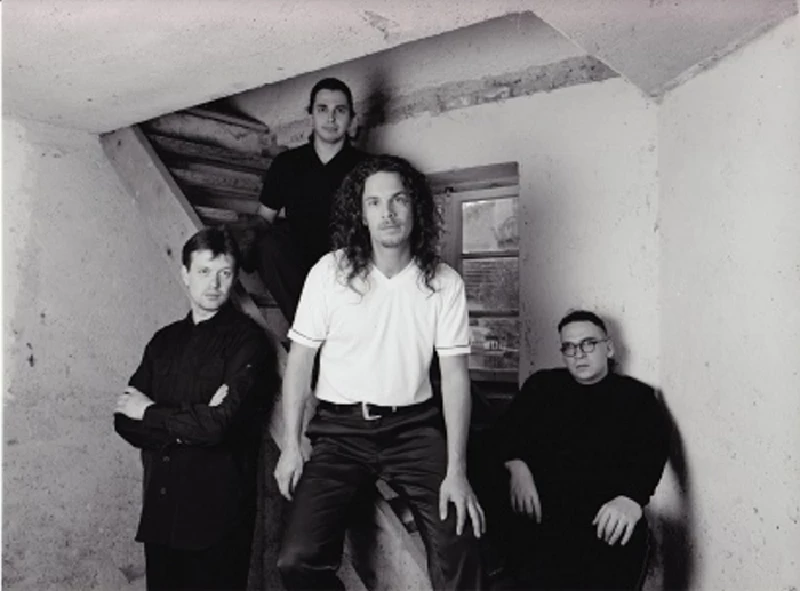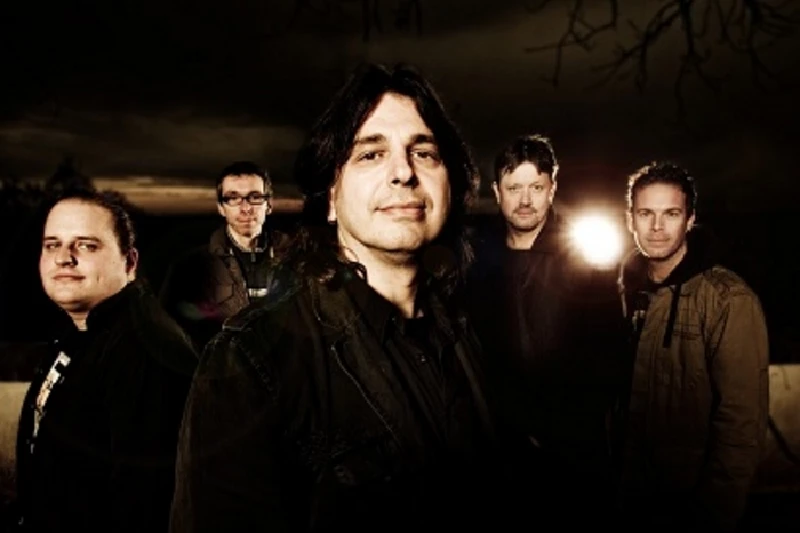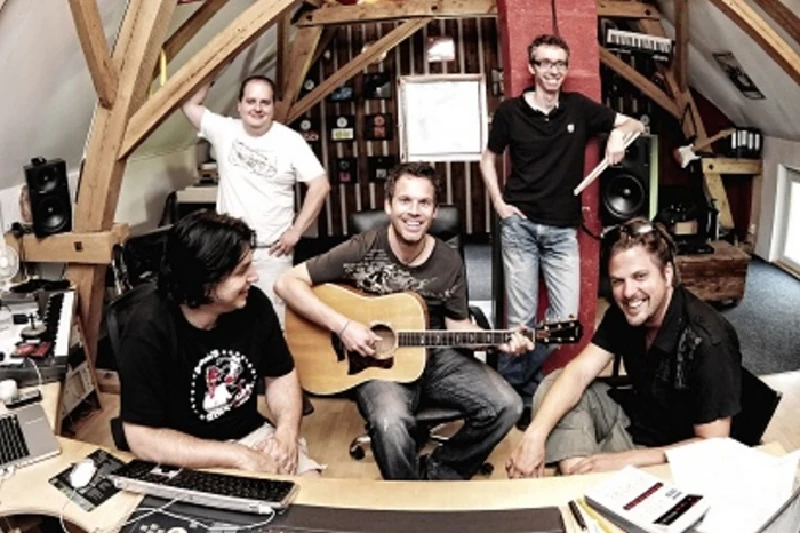RPWL - Interview
by Lisa Torem
published: 13 / 3 / 2012

intro
Lisa Torem speaks to Yogi Lang, the front man with German prog band RPWL, about his group's latest Nietzche-inspired album, ‘Beyond Man and Time'.
When the German prog rock band, RPWL, formed in 1998, it appeared that their immediate goal was to be a Pink Floyd covers band. The acronym, RPWL, was simply based on the then line up of Phil Paul Rissettio, Chris Postl, Kalle Waller and lead vocalist Yogi Lang. Two years later ‘God Has Failed’ (2000), their debut CD, foreshadowed one of their obvious strengths: their lyrical depth. From the onset, RPWL has explored profound themes that are inspired by nature, religion, philosophy, and then, of course, there are the driving, often surrealistic, global arrangements that make their instrumental work unique. The band has been consistently prolific, without losing sight of their earliest influences. Even after the inventive ‘Trying To Kiss the Sun’(2002), ‘Stock’ (2003) included a cover of Syd Barrett’s ‘Opel.’ As Genesis was another inspirational force, ‘World Through My Eyes’ (2005) was enhanced by the vocals of former Genesis/Stiltskin member, Ray Wilson. Also, in 2005, they released the ambitious double live CD, ‘Start the Fire’. During the band’s constant evolution, Yogi Lang increased his compositional input. On ‘9’ in 2007, four of his solo works were featured. By 2008, the band took stock of its own perceived image by including the humorous ‘This Is Not a Prog Song’ in ‘The RPWL Experience’ (2008). And, indeed, the band had proven that a body of work flush with the aforementioned global rhythms, plus surrealistic sound bytes and introspective themes, set them apart as a truly inventive entity. In perhaps, their most ambitious project to date, Yogi Lang talks about RPWL’s newest release, ‘Beyond Man and Time’, which is based on the philosophies of Nietzsche. PB: Twelve years ago RPWL started out as a Pink Floyd tribute band with a different bassist and percussionist and four members, not five. Can you fill us in on how you originally formed the band and then explain what prompted the band ultimately to move on to writing original music and expanding the sound? YL: I knew Kalle, the guitar player, from a production I did in the early 90s called ‘Violet District’. After a long period of studio work through the 90s as a producer, I met him again in the late 90s. We both had the idea of doing live music again and so, together with Phil and Chris, old friends of ours, we did a couple of concerts, jamming over old Pink Floyd themes. That is the story of the Pink Floyd cover band; so we never were a real cover band, but more four guys playing four songs in two hours. Already in the very beginning, it became clear that we wanted to do our own stuff and so we did a demo tape. A guy from a record label heard the songs and wanted to do a record. That was in 2000 and so ‘God Has Failed’ was born. There were a couple of changes because the band took more and more time out of our life. PB: You had some striking ballads in your solo album, ‘No Decoder’, such as ‘Sail Away’, ‘Can’t Reach You’ and even one , ‘Alison’, sung in French. Kalle Wallner, has also had the opportunity to branch out by doing solo work with his project Blind Ego. Do you feel that those projects influenced the songwriting within RPWL? YL: Yes, it's like composing away your personal things. Just have a look at my solo album: It is filled with my thoughts about the unavoidable communication errors between us as individuals. But those would have closed the door to something higher like in ‘Beyond Man and Time’. PB: RPWL’s debut, ‘God Has Failed’, made a strong philosophical statement. Why has philosophy continued to be so important in your songwriting? How do you and Kalle divide up your writing efforts? YL: Our future lies in a new culture of thinking that is also what ‘Beyond Man and Time’ is about. It is a pity that we made philosophy, or as we better say, "thinking", to a university discipline. So we gain knowledge in a breathtaking tempo without any progress of wisdom. And, of course, there is not much hope as long as money is the helmsman of all development and our so-called institutions of morality as the initiators of a "deadlock of mind". We always start a new album with a certain theme and then we bring our ideas together. Kalle's part is more the composing part of the whole thing. PB: In ‘Beyond Man and Time’, you continue the art of the melodic ballad with tracks like ‘We Are What We Are’ and ‘Unchain the Earth’.In this lyric from the former song, you sing, “Standing on the mountain/I’ve seen your mothers and your fathers/The world from which you came…” and then the song takes on a deeper, more personal tone. What are you thinking and feeling as you sing these lyrics? YL: Like in the allegory of the cave by Plato, the process of recognition comes with being isolated by those who are left in the old world. Every figure he meets in the story is a song. This figure is the keeper between the two worlds: The world of new original thinking and the old world, shaped by what we call the "deadlock of the mind and spirit". The keeper paves his way, prepares him, and tells him about the shallow world and of the courage that he needs to tear down the old edifice of ideas. “I’ve seen your mothers and your fathers/The world from which you came/But never saw you home” means that the world from where he came is the world where he doesn't belong anymore. And so the journey begins, outside the cave, in the world ‘Beyond Man and Time’. PB: The opening song, ‘Transformed’ begins with very light spacious percussion. It is ethereal and almost other worldly. Marc Turiaux demonstrated some major restraint there. Isn’t that a difficult task for a percussionist? YL: The percussion is morphed with some effects that make it very “space like”. It is the way to the entrance of the cave, of the old world. All you have seen was like shadows on a wall, pictures from something that might be a truth, but never the truth itself. So all the space things in there are showing the unknown, the unthinkable. PB: ‘The Fisherman’ uses a completely different scale than the other songs. It is also almost twenty minutes long. One of the lines is “We shall be the bridge over the valleys of our being.” Why are the songs so varied in length? And how did you come up with some of the metaphors? YL: All the figures lead into this last figure that searches truth deep inside man. Of course, this figure is very close to Jesus in Christianity, but there are main differences. His bait is not fear or anxiety, his bait is joy. Don't get me wrong! This is not against religion at all. The principle of God in all religions is the principle of the unthinkable and will always contain a kind of logic. It is what we've made out of it up to now. The institutions of religion used fear to create a certain kind of social structure or higher power that leads to a "deadlock of the mind". Everything we think comes from ourselves, and so that is what is meant by the sentence of “We shall be the bridge over the valleys of our being.” Our comprehensible being is an evolutionary experiment. The gift that we get out of this is our ability of freethinking. It will take us to a next step and it will be connected with an essential re-evaluation of all values. That is also the reason why there is no conclusion in the end. Because the conclusion is a new culture of thinking. Any conclusion had to be questioned again. PB: You and Markus Jehle are listed as playing keys for ‘Beyond Man and Time’. The synth work sounds very complex. How did you work out those arrangements? And there is quite a powerful battle that takes place between Kalle’s guitar and the synth. Were any of these passages improvised or were they set before you went into the studio? YL: Most of the music is written directly to the journey or the figures of the story. We wanted to have clear melodies to transport the message and colourful instrumental parts to paint the journey in the new world. I did all the keyboards in the studio on my own. Markus has the thankless task of bringing all the ideas on stage. The synth work may sound complex because I'm doing most of the sounds with analogue gear. The main synth is a moog memory moog and minimoog. It may sound strange, but these are natural instruments and sounds to me. PB: The new album is based on the philosopher Nietzsche’s version of Zarathustra (‘Thus Spoke Zarathustra’). Even Nietzsche claimed this text was “the deepest ever written.” Classical composers such as Richard Strauss and Gustav Mahler used this as a text as well. But it’s unusual for a prog rock band to venture into this realm. Why were you so ambitious and how did you break the story down into parts that could be examined musically? YL: It was no option to do the next stupid fantasy story. The world suffers from senseless entertainment to draw off attention from what brings true and real awareness. And prog is no exception at all... Like in Nietzsche's ‘Zarathustra’, the protagonist meets several figures that help him to reach a higher lever of thinking. Some of the figures are taken from Zarathustra's ‘Honey Sacrifice’. PB: How long did it take to create the songs and then to record them? YL: I think I wrote down the first words in the beginning of 2011. At this time, Kalle came up with the first music ideas and we recorded the first demos. The production of the album started in the middle of 2011. The recording was finished at the end of last year and the master was finished by the beginning of the new year. It took us about a year to make ‘Beyond Man and Time’. PB: You say that you want people to “open their eyes.” In the original song, ‘The Wise in the Desert’ you sing, “Together they are gathered, just flocks of silly sheep.” Does this statement have a deeper meaning now than when Nietzsche’s work was written? YL: The only truth lies in our individuality. Everything has to be questioned and so at least there can't be a global truth. There may be a common sense, a common spirit coming out of a new culture of thinking. But that has nothing to do with given ancient, not reflected words. But it is easy, easy for everybody because there is no self-responsibility in a given moral structure. Again it is not the easiest way to go out of the cave, to tear down old houses of lies, but it is the only way of true recognition. PB: ‘The Ugliest Man in the World’ balances violent thrashing and a heartfelt ballad. Would you describe this song as hopeful or bleak? YL: Hopeful! The wanderer meets a deformed man that calls himself "The Ugliest Man in the World." But soon he discovers that the so-called ugliest man is only the "unmasked" human being. But without a culture of repression we don't need this mask, and the acceptance of what we are fades away the ugliness and makes us complete. So again it is the self-responsibility that makes us complete! PB: RPWL plans to tour Europe in support of the album in 2012. What can the fans expect onstage visually? What else is in the works for you personally and RPWL? YL: Yes, there will be a European tour and we're all looking forward to it! The main part of the show will be, of course, the new album. At the moment, we are working on the show. We recorded a shadow play showing the journey and the figures of the story. There will be a lot to discover in the show. We will play the shows and maybe we're going to record a DVD with the whole live show. Besides all of that, Kalle and I do have plans for our solo projects. Kalle will be next with a new Blind Ego album, but that is a story for 2013! PB: Thank you.
Picture Gallery:-


most viewed articles
current edition
John McKay - InterviewRobert Forster - Interview
Cathode Ray - Interview
Spear Of Destiny - Interview
Fiona Hutchings - Interview
When Rivers Meet - Waterfront, Norwich, 29/5/2025
Carl Ewens - David Bowie 1964 to 1982 On Track: Every Album, Every Song
Chris Wade - Interview
Brian Wilson - Ten Songs That Made Me Love...
Shrag - Huw Stephens Session 08.12.10 and Marc Riley Session 21.03.12
previous editions
Heavenly - P.U.N.K. Girl EPBoomtown Rats - Ten Songs That Made Me Love....
Allan Clarke - Interview
Manic Street Preachers - (Gig of a Lifetime) Millennium Stadium, Cardiff, December 1999
Oasis - Oasis, Earl's Court, London, 1995
Barrie Barlow - Interview
Dwina Gibb - Interview
Beautiful South - Ten Songs That Made Me Love...
Pixies - Ten Songs That Made Me Love...
Sound - Interview with Bi Marshall Part 1
most viewed reviews
current edition
Peter Doolan - I Am a Tree Rooted to the Spot and a Snake Moves Around Me,in a CircleVinny Peculiar - Things Too Long Left Unsaid
Garbage - Let All That We Imagine Be The Light
Vultures - Liz Kershaw Session 16.06.88
John McKay - Sixes and #Sevens
Little Simz - Lotus
HAIM - I Quit
Morcheeba - Escape The Chaos
Eddie Chacon - Lay Low
Billy Nomates - Metalhorse
Pennyblackmusic Regular Contributors
Adrian Janes
Amanda J. Window
Andrew Twambley
Anthony Dhanendran
Benjamin Howarth
Cila Warncke
Daniel Cressey
Darren Aston
Dastardly
Dave Goodwin
Denzil Watson
Dominic B. Simpson
Eoghan Lyng
Fiona Hutchings
Harry Sherriff
Helen Tipping
Jamie Rowland
John Clarkson
Julie Cruickshank
Kimberly Bright
Lisa Torem
Maarten Schiethart